Search the Special Collections and Archives Portal
Search Results
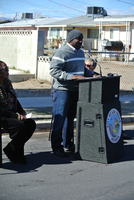
Photograph at Berkley Square Historic District banner unveiling event, February 9, 2013
Date
Archival Collection
Description
Councilman Ricki Barlow speaking at banner unveiling event in the Berkley Square neighborhood of Las Vegas, February 9, 2013.
Image
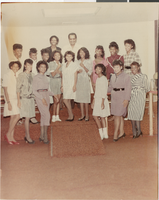
Photograph of Black Teen Pageant contestants and Greg Morris, 1970s
Date
Archival Collection
Description
Color photograph of contestants of the Miss Black Teen pageant. Greg Morris (back row, center) emceed the event.
Image
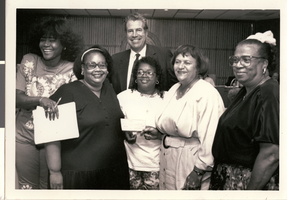
Photograph of Marzette Lewis with principal Shirley Burbera
Date
Archival Collection
Description
Black and white photograph of Marzette Lewis with principal Shirley Burbera and others displaying a donation check.
Image
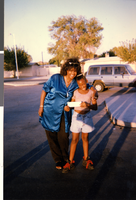
Photograph of Marzette Lewis and a student with a donation
Date
Archival Collection
Description
Color photograph of Marzette Lewis and a student displaying a $250 donation check.
Image
Juanita Fain oral history interview
Identifier
Abstract
Oral history interview with Juanita Fain conducted by Claytee D. White on November 19, 2021 for the African Americans in Las Vegas: A Collaborative Oral History Project. In this interview, Fain recalls her childhood in Newark, New Jersey and earning a doctorate degree in Higher Education administration from The Ohio State University. After she was hired by Carol Harter at Ohio State in 1980 as Director of Financial Aid, she came to the University of Nevada, Las Vegas (UNLV) in 1996 as Dean of Enrollment and Management. After various positions, she became Vice President of Student Affairs and in 2021, Interim Chief Diversity Officer was added to her responsibilities. Fain will retire in 2023 after serving her final year as a Special Liaison to President Whitfield.
Archival Collection
Fateen Seifullah oral history interview
Identifier
Abstract
Oral history interview of Fateen Seifullah conducted by Claytee D. White on October 28, 2020 for African Americans in Las Vegas: a Collaborative Oral History Project.
Fateen Seifullah was born in Compton, California and was surrounded by gang culture from a very early age. As a teenager when he and his family moved to Las Vegas in the early 1980s, he began participating in gang activity. Fateen describes his knowledge about gang operations, drug "rules," and prison time. He also discusses his participation as a Muslim mosque leader in the Historic Westside Las Vegas, his "Iman" (faith and beliefs), and his work in the past decade to push gang activity and drug use out of the community.
Subjects discussed include: Compton, California; drug culture; Muslim philosophy; Iman; and Code of Justice.
Archival Collection
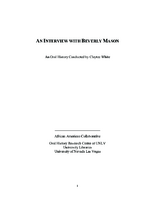
Transcript of interview with Beverly Mason conducted by Claytee White, December 21, 2012
Date
Archival Collection
Description
Transcript of interview with Beverly Mason by Claytee White, December 21, 2012. Mason grew up in West Las Vegas and was part of the school integration movement in the 1970s. Her involvement in the Las Vegas School System has continued throughout her life. In the interview, she discusses her family and faith, and working at the Nevada Test Site. Beverly attended Whittier College in California, where she majored in Biology. She later received her Masters in Organizational Management from the University of Phoenix. She brought her experience back to Nevada and went to work for the Nevada Test Site as an industrial hygienist. She chose to leave that job to focus on her family, and found a new career in the School Community Partnership Office as a program manager. She focuses on connecting students with professionals in the science, math, and technology fields to bolster interest in those careers. Beverly has always been involved in her community and her church. Beverly attended the Church of God in Christ when she was growing up, and continues to participate in services today. Her family and her faith are extremely important parts of her life. She is married to Marcus Mason and has a daughter named Cassidy.
Text
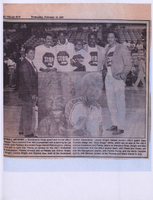
Newspaper clipping, "Basketball Artistry," with photograph of Lonnie Wright with UNLV Basketball Association presenting Reggie Theus with a painting, February 18, 1987
Date
Archival Collection
Description
Lonnie Wright, along with the UNLV Basketball Association, presented a painting to former UNLV athlete Reggie Theus. Lonnie helped design the "Stop Drugs" shirts that the other members are wearing.
Image
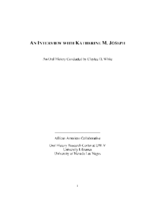
Transcript from interviews with Katherine M. Joseph by Claytee White, October 25, 2004 and September 5, 2007
Date
Archival Collection
Description
Two-session interview with Katherine M. Joseph by Claytee White, October 25, 2004, and September 5, 2007. Joseph is a community activist and was a co-worker of Lubertha Johnson, and involved with Operation Independence. In the interview, Johnson discusses her family, her employment, and life on the Westside.
Text
Calvin Shields oral history interview
Identifier
Abstract
Oral history interview with Calvin Shields conducted by Claytee D. White on May 07, 2009 for the Boyer Early Las Vegas Oral History Project. Shields begins by discussing his upbringing in Florida and his early interest in playing the trumpet before being drafted into the United States Army during World War II, where he learned how to play the drums in a military orchestra. Shields describes his career as a musician following his military service, playing as a drummer for singers such as Sammy Davis Jr. and Billy Williams and in various club and casino orchestras in Las Vegas, Nevada. Shields provides his experiences of segregation in Las Vegas as an African American man, and discusses how African American culture has changed and progressed.
Archival Collection
